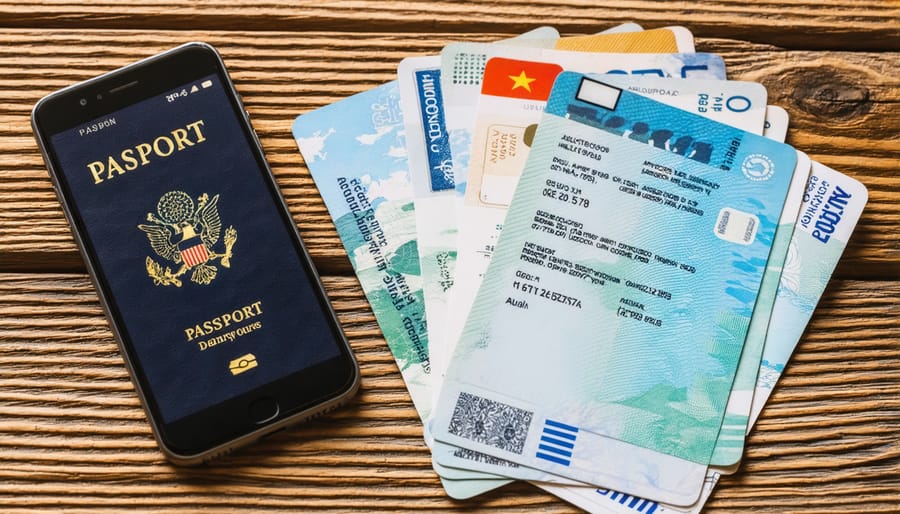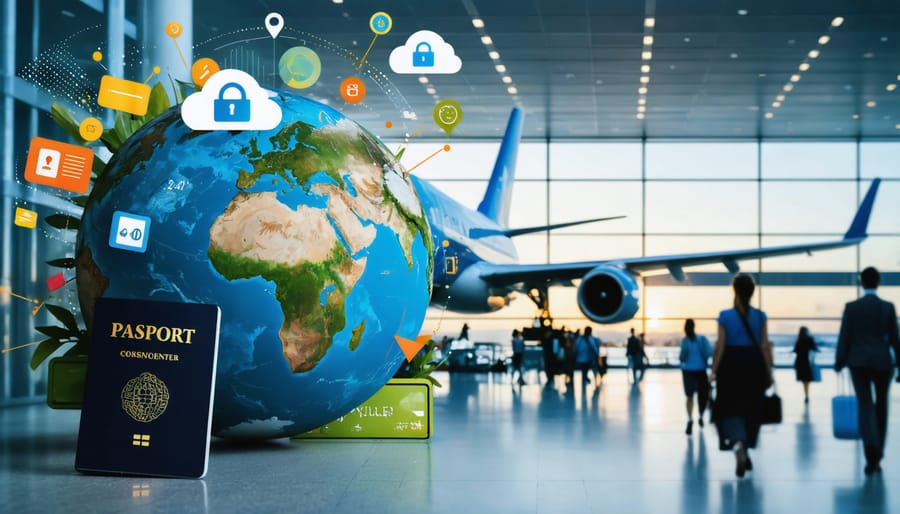Pack essential travel documents in multiple secure locations – store digital copies in cloud storage, physical copies with trusted contacts at home, and originals in a money belt or hotel safe. Register with your embassy before departure and implement responsible travel practices through every stage of your journey. Monitor local news and government travel advisories in the weeks leading up to your trip, noting potential safety concerns or required precautions for your destination. Research emergency medical facilities, police stations, and your country’s nearest embassy or consulate – save their contact information offline and share your detailed itinerary with family members. While adventure beckons with endless possibilities, smart preparation creates the foundation for worry-free international exploration.
Before You Leave Ontario
Smart Documentation Practices
Just as we follow our winter travel safety guidelines here in Ontario, protecting your travel documents abroad requires careful planning and smart backup strategies. Start by creating multiple copies of your essential documents – passport, travel insurance, visas, and itinerary. Keep one set in your carry-on and another securely stored in your checked luggage.
Here’s my favorite travel hack: scan all your documents and email them to yourself and a trusted family member. I also recommend storing encrypted copies in a secure cloud service you can access from anywhere. This has saved many Ontario travelers when their physical documents were lost or stolen!
Create a simple document with emergency contacts, including the nearest Canadian embassy or consulate in your destination countries. Add local emergency numbers and your travel insurance hotline. Store this information both digitally and in print form.
Pro tip: Keep your physical documents in a water-resistant pouch or zip-lock bag. Trust me, nothing’s worse than dealing with water-damaged papers when you’re trying to cross borders! For extra security, consider using a password-protected folder on your phone for document photos, and always enable two-factor authentication for your cloud storage accounts.
Remember to leave copies of your travel documents with someone you trust back home in Ontario – they can be your backup plan if all else fails.

Health and Insurance Essentials
Before jetting off on your international adventure, let’s talk about one of the most crucial aspects of travel prep – your health and insurance coverage. Trust me, as someone who’s learned this lesson the hard way, good travel insurance isn’t just another expense – it’s your safety net abroad!
Look for a comprehensive travel insurance policy that covers medical emergencies, trip cancellations, and lost baggage. As an Ontario resident, check if your existing health insurance offers any international coverage, but don’t rely on that alone. Many provincial health plans offer limited coverage outside Canada, which might leave you with hefty medical bills in case of emergencies.
Visit your family doctor or a travel clinic at least six weeks before your departure. They’ll review your destination’s required vaccinations and health risks. Keep a digital and physical copy of your vaccination records and insurance documents – you never know when you’ll need them!
If you take prescription medications, pack enough for your entire trip plus extra in case of delays. Keep them in their original containers with prescription labels, and carry a doctor’s note describing your medical conditions. Pro tip: pack medications in your carry-on luggage – checked bags can get lost!
Don’t forget to research healthcare facilities at your destination and save emergency contact numbers. Having this information ready before you need it can make a world of difference in a medical emergency abroad.
Staying Safe in Your Destination

Accommodation Security
Your accommodation choice can make or break your travel experience, and safety should be a top priority. As an Ontario traveler who’s explored countless destinations, I’ve learned that a little preparation goes a long way in securing safe lodging.
Start by researching neighborhoods thoroughly before booking. Opt for well-reviewed areas with good lighting and regular foot traffic. When choosing accommodations, prioritize properties with 24-hour front desk service, security cameras, and electronic key card systems. These features might cost a bit more, but they’re worth the peace of mind.
Once you’ve checked in, take a few simple precautions. Always use all available locks, including deadbolts and security chains. Get familiar with emergency exits and keep a small flashlight handy – you’d be surprised how often power outages occur in some destinations! I always bring a rubber doorstop for extra security, especially when staying in guesthouses or smaller hotels.
Keep your valuables secure by using the in-room safe or front desk storage. If these aren’t available, consider using a portable travel safe. Avoid leaving expensive items visible through windows, and never open your door without verifying who’s there.
For those embracing eco-friendly travel, many sustainable accommodations actually offer superior security features, as they tend to be newer or recently renovated. Plus, these properties often have more engaged staff and stronger community connections, adding an extra layer of safety to your stay.
Transportation Safety
When exploring foreign destinations, knowing how to navigate local transportation safely can make or break your travel experience. As an avid traveler who’s explored countless cities worldwide, I’ve gathered some essential safe transportation tips to help you move around with confidence.
Always research reliable transportation options before arriving at your destination. Official taxis, registered ride-sharing services, and public transit systems are typically your safest bets. In many cities, it’s worth downloading local transportation apps and saving them offline. When taking taxis, ensure they’re properly licensed and use meters or agree on fares beforehand.
If you’re renting a vehicle, familiarize yourself with local driving laws and road signs. Remember that many countries drive on the left side of the road, and traffic rules can vary significantly from what we’re used to in Ontario. Consider whether driving is necessary – in many destinations, public transportation might be more convenient and eco-friendly.
When using public transit, keep your belongings close and be aware of your surroundings, especially during rush hours. Consider purchasing transit passes in advance and keep small change handy for fares. During late hours, opt for well-lit, busy routes and consider traveling with companions.
For shorter distances, walking can be wonderful, but stick to populated areas and well-lit streets. If cycling, always rent from reputable shops and wear appropriate safety gear, even if locals don’t.
Personal Safety in Public Spaces
Exploring new places is exciting, but staying alert in public spaces is crucial for a safe and enjoyable journey. To blend in like a local, avoid wearing flashy jewelry or displaying expensive electronics that might attract unwanted attention.
Keep your belongings close, using a cross-body bag or anti-theft backpack rather than a regular purse. I always recommend walking confidently and purposefully, even if you’re not entirely sure where you’re going. When in doubt, step into a shop or café to check your map or phone rather than standing on the street looking lost.
Stay aware of your surroundings by limiting headphone use and keeping an eye on who’s around you. Trust your instincts – if something doesn’t feel right, move to a more populated area or seek help from local authorities or businesses. During evening hours, stick to well-lit streets and busy areas, preferably exploring with a travel companion.
Consider carrying a dummy wallet with a small amount of cash while keeping your main cards and documents secure in a hidden money belt. Photography enthusiasts should be mindful of local customs and always ask permission before taking pictures of people or restricted areas.
Remember that confidence is key – walk with purpose, stay alert without appearing anxious, and you’ll be better equipped to handle any situation that comes your way.

Digital Safety While Traveling
Secure Communication
Staying connected with loved ones while traveling internationally isn’t just about sharing your adventures – it’s a crucial safety measure. Before departing, set up a reliable communication plan with family members back home, including regular check-in times that work across time zones.
Consider using encrypted messaging apps like Signal or WhatsApp for secure communications. These apps work over WiFi, helping you avoid expensive international calling rates while keeping your conversations private. Remember to download and set up these apps before leaving Ontario, as some countries might restrict access to certain services.
When it comes to banking, never access your financial accounts using public WiFi networks in hotels, cafes, or airports. Instead, use a trusted Virtual Private Network (VPN) to encrypt your internet connection. Set up your VPN before leaving home and test it to ensure it works properly.
For added security, inform your bank about your travel dates and destinations to prevent your cards from being blocked due to suspicious activity. Consider setting up a separate travel account with limited funds rather than accessing your main accounts while abroad.
Keep digital copies of important documents in a secure cloud storage service, and share access with a trusted family member. This provides a backup if your physical documents are lost or stolen. Remember to log out of all banking apps and secure messaging services when using shared devices, and clear your browsing history afterward.
Device Security
In today’s connected world, keeping your devices secure while traveling is just as important as watching your wallet. Before heading out, back up all your devices to a secure cloud service or external drive – trust me, you’ll thank yourself later if anything happens to your phone or laptop during your adventures!
Set up strong passwords and enable two-factor authentication on all your devices and important accounts. I always create a separate travel email password and change it back when I return home – it’s a simple extra layer of security that can make a big difference.
When using public Wi-Fi in airports, cafes, or hotels, always connect through a reliable VPN to encrypt your data. Avoid accessing sensitive information like online banking unless absolutely necessary, and if you must, use your mobile data instead of public networks.
Consider bringing a power bank and keeping your devices charged – a dead phone can’t help you navigate or make emergency calls. Pack a spare phone if possible, and store important documents and emergency contacts both digitally and in hard copy.
Here’s a savvy traveler tip: turn off your Bluetooth and Wi-Fi when you’re not using them. This not only saves battery life but also prevents potential security breaches. And remember to avoid using public charging stations – they can be compromised to steal your data. Instead, bring your own charging cables and adapters.
Emergency Response Planning
Emergency Contacts and Resources
Before heading abroad, save these essential emergency contacts in your phone and keep a physical copy in your wallet. The local Canadian embassy or consulate should be your first point of contact in serious situations – find and save their numbers for your destination countries before departure.
Program these universal emergency numbers: 112 (Europe), 911 (North America), and research local emergency numbers for your specific destinations. Save the 24/7 Emergency Watch and Response Centre at +1 613-996-8885, which assists Canadians abroad.
Keep digital and printed copies of important documents like your passport, travel insurance policy (with emergency contact numbers), and medical information. Consider using the ArriveCAN app for easier border crossing when returning home.
Quick response procedures:
– Medical emergency: Call local emergency services first, then contact your travel insurance provider
– Lost passport: Report to local police and contact nearest Canadian embassy
– Natural disaster: Follow local authority instructions and contact the embassy for evacuation assistance
– Theft: File police report, contact embassy, and notify your bank if cards were stolen
Remember to register with the Registration of Canadians Abroad service for emergency updates and assistance during crises.
Quick Response Guidelines
When faced with an emergency abroad, remember these quick response steps to handle common situations effectively. If you’ve lost your passport, immediately contact the nearest Canadian embassy or consulate – keep their contact information saved offline. For medical emergencies, first call local emergency services, then contact your travel insurance provider’s 24-hour assistance line.
If you’re robbed, find a safe location and contact local police to file a report – you’ll need this for insurance claims. Keep digital copies of the report and all related documents. For natural disasters, follow local authority instructions and monitor the Government of Canada’s travel advisories through their official channels.
Lost your wallet? Immediately cancel your cards and contact your bank’s international assistance line. Always keep an emergency cash reserve separate from your main wallet. If you’re stranded due to transportation issues, contact your airline or travel provider first, then your travel insurance company for coverage of unexpected expenses.
Remember to stay calm, ensure your immediate safety, and reach out to appropriate authorities. Having these steps mentally prepared before your trip can make a stressful situation much more manageable.
International travel opens up a world of incredible experiences, and with the right preparation, you can explore confidently and safely. Remember to keep your important documents secure and backed up digitally, stay aware of your surroundings, and trust your instincts when something doesn’t feel right. Being proactive about your safety doesn’t mean being paranoid – it means being smart and prepared.
Keep emergency contacts handy, stay connected with loved ones back home, and always have a backup plan. Research your destinations thoroughly, respect local customs, and consider purchasing comprehensive travel insurance for peace of mind. Don’t forget to register with the Canadian government’s travel advisory service before departure.
While these safety measures are important, don’t let them overshadow the joy of discovering new places and cultures. Most international destinations are welcoming to visitors, and with these precautions in place, you can focus on creating unforgettable memories. Stay informed, stay prepared, but most importantly, stay open to the amazing adventures that await you around the globe. Safe travels!














+ There are no comments
Add yours